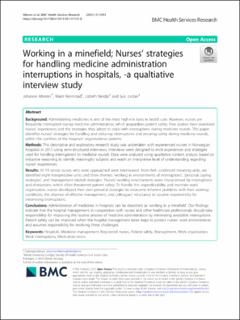| dc.contributor.author | Alteren, Johanne | |
| dc.contributor.author | Hermstad, Marit | |
| dc.contributor.author | Nerdal, Lisbeth | |
| dc.contributor.author | Jordan, Sue | |
| dc.date.accessioned | 2023-07-05T09:05:02Z | |
| dc.date.available | 2023-07-05T09:05:02Z | |
| dc.date.created | 2021-10-17T13:01:43Z | |
| dc.date.issued | 2021 | |
| dc.identifier.citation | BMC Health Services Research. 2021, 21, 1-10. | en_US |
| dc.identifier.issn | 1472-6963 | |
| dc.identifier.uri | https://hdl.handle.net/11250/3076036 | |
| dc.description.abstract | Background: Administering medicines is one of the most high-risk tasks in health care. However, nurses are frequently interrupted during medicine administration, which jeopardises patient safety. Few studies have examined nurses’ experiences and the strategies they adopt to cope with interruptions during medicine rounds. This paper identifies nurses’ strategies for handling and reducing interruptions and ensuring safety during medicine rounds, within the confines of the hospitals’ organisational systems. Methods: This descriptive and exploratory research study was undertaken with experienced nurses in Norwegian hospitals in 2015 using semi-structured interviews. Interviews were designed to elicit experiences and strategies used for handling interruptions to medicine rounds. Data were analysed using qualitative content analysis based on inductive reasoning to identify meaningful subjects and reach an interpretive level of understanding regarding nurses’ experiences. Results: All 19 senior nurses who were approached were interviewed. From 644 condensed meaning units, we identified eight interpretative units and three themes: ‘working in environments of interruptions’, ‘personal coping strategies’, and ‘management-related strategies’. Nurses’ working environments were characterised by interruptions and distractions, which often threatened patient safety. To handle this unpredictability and maintain ward organisation, nurses developed their own personal strategies to overcome inherent problems with their working conditions, the absence of effective management, and colleagues’ reluctance to assume responsibility for minimising interruptions. Conclusions: Administration of medicines in hospitals can be described as ‘working in a minefield’. Our findings indicate that the hospital management, in cooperation with nurses and other healthcare professionals, should take responsibility for improving the routine process of medicine administration by minimising avoidable interruptions. Patient safety can be improved when the hospital management takes steps to protect nurses’ work environments and assumes responsibility for resolving these challenges. | en_US |
| dc.language.iso | eng | en_US |
| dc.relation.uri | http://dx.doi.org/10.1186/s12913-021-07122-8 | |
| dc.rights | Navngivelse 4.0 Internasjonal | * |
| dc.rights.uri | http://creativecommons.org/licenses/by/4.0/deed.no | * |
| dc.title | Working in a minefield; Nurses’ strategies for handling medicine administration interruptions in hospitals, -a qualtiative interview study | en_US |
| dc.type | Peer reviewed | en_US |
| dc.type | Journal article | en_US |
| dc.description.version | publishedVersion | en_US |
| dc.source.pagenumber | 1-10 | en_US |
| dc.source.volume | 21 | en_US |
| dc.source.journal | BMC Health Services Research | en_US |
| dc.identifier.doi | 10.1186/s12913-021-07122-8 | |
| dc.identifier.cristin | 1946479 | |
| dc.source.articlenumber | 1094 | en_US |
| cristin.ispublished | true | |
| cristin.fulltext | original | |
| cristin.qualitycode | 2 | |

